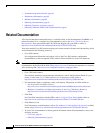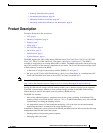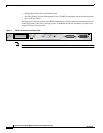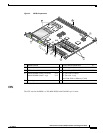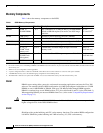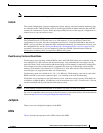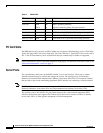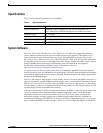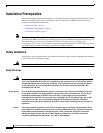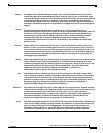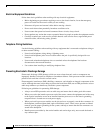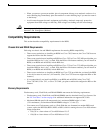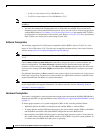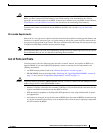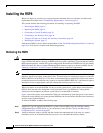
3
Route Switch Processor (RSP8) Installation and Configuration Guide
OL-4920-02
Product Description
–
Ordering Documentation, page 89
–
Documentation Feedback, page 89
–
Obtaining Technical Assistance, page 89
–
Obtaining Additional Publications and Information, page 91
Product Description
The topics discussed in this section are:
• CPU, page 5
• Memory Components, page 6
• Jumpers, page 7
• LEDs, page 7
• PC Card Slots, page 8
• Serial Ports, page 8
• Specifications, page 9
• System Software, page 9
The RSP8 supports the VIP2, VIP4 and the VIP6-80 in the Cisco 7505, Cisco 7507, Cisco 7507-MX,
Cisco 7513, Cisco 7513-MX, and Cisco 7576 routers. (See Figure 1 and Figure 2.) The RSP8 is
available as an upgrade to an existing RSP4, RSP2, or RSP1. The RSP8 contains the central processing
unit (CPU) and most of the memory components for the router. The Cisco IOS software images reside
in Flash memory, located on the RSP8:
• In the form of a single in-line memory module (SIMM) (U1 in Figure 2)
• On up to two PC Cards (called Flash memory cards), or two Flash Disks, or a combination of PC
Cards and Flash Disks that insert in the two PC Card slots (slot 0 and slot 1)
Note For the Cisco IOS releases that are supported on the RSP8, refer to the “System Software” section on
page 9 and to the Software Advisor at http://www.cisco.com/cgi-bin/Support/CompNav/Index.pl.
Storing the IOS software images in Flash memory enables you to download and boot from upgraded
Cisco IOS software images remotely or from software images resident in the RSP8 Flash memory,
without having to remove and replace read-only memory (ROM) devices.
The RSP8 also contains:
• Most of the additional memory components used by the system, including 16-d onboard Flash
memory and up to two Flash memory cards (16-, 20-, or 32-MB Flash memory card, with a 20-MB
Flash memory card being the shipping default).
• Air-temperature sensors for environmental monitoring. (All of the logic for the environmental
monitoring functions is contained on the router interface card.)
In addition to running the system software from DRAM, the RSP8 contains and executes the following
management functions that control the system:
• Sending and receiving routing protocol updates
• Managing tables and caches




